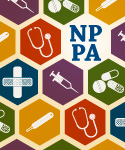November 1st, 2017
Medical Trick-or-Treat
Elizabeth Donahue, RN, MSN, NP-C
It’s one of my favorite times of year. The colors of the leaves are changing, there is a crisp feel to the air, and it’s Halloween time. The candy aisles are decimated, kids have donned their costumes and hit their preplanned routes or parties, and even some of the grown-ups have dressed up and managed to escape reality for a few minutes at a neighborhood fete. My mind on the “trick-or-treating” hubbub, I began to reflect on how my work can often feel like a professional version of this fun childhood tradition.
There are days when my whole shift feels like one big trick. Complex post–hospital discharge visits that require far longer slots than the one in which they’ve been booked, a walk-in complaint of chest pain, a request for 12 pages of paperwork that is due tomorrow, etc. This day is the equivalent of the neighbor in your childhood who used to drop a toothbrush into your pillowcase full of sweets.
Then there are treat days. A few “no-shows” sprinkled in between physicals for young, healthy folks with few complaints, writing and closing your notes as you go, reaching a patient with abnormal results without playing phone tag at all! This day is like finding the house on your street that is giving out full-size candy bars instead of the mini versions.
Some conditions and outcomes can feel like trick-or-treat situations as well. Sometimes the diagnosis seems so obvious, so clear, that you hesitate to even make a differential. For example, I saw a patient the other day in her early fifties who had all the hallmark signs of menopause and only ONE symptom of hypothyroidism. I almost didn’t check her TSH because it seemed such an open-and-shut case. But guess what — the trick was on me — her levels were through the roof. In this case, the hoofbeats didn’t point to the lead horse; there was a zebra in the crowd. (Now that I’m thinking of it, that would make a great group costume for a bunch of residents — a bunch of horses, one zebra. Anyway…). It’s so unexpected, like receiving a ketchup packet. (That really happened to me once as a kid.)
At other times, the outcome is surely a treat. A patient who is dear to me was diagnosed a few years ago with a kidney tumor. The prognosis was, as my childhood “Magic 8 Ball” might have predicted, “outlook not so good.” Based on the tumor characteristics on imaging, it had a less than 5% chance of non-malignancy. The renal team was lovely, and one fellow explained that the location of the tumor (close to the major vessels) would likely result in the removal of the entire kidney. And yet, when the surgery was complete, the attending called down saying that he had managed to remove it entirely without taking the kidney. And several days later, the path came back negative. Equivalent of a king-sized candy bar.
And then there are the mixed bags. Recently, a patient involved in a car accident underwent some imaging to rule out a musculoskeletal injury, and the CT showed an incidentaloma at the base of a lung. Follow-up showed that he indeed has lung cancer but, having been caught early, he has no metastases or lymph node involvement. The car accident was a trick, the nodule a trick, the cancer a trick — but finding it all before it was much worse and all by coincidence — kind of a treat.
In primary care practice, as in life, we never know what a day will bring. The surprising or unexpected turns — whether tricks or treats — keep us on our toes and perhaps make us better, more open-minded clinicians in the end.





Another great post. Hope you had a happy Halloween.
Wow! Can I relate to that!
“Complex post–hospital discharge visits that require far longer slots than the one in which they’ve been booked…” My favorite pet peeve!
My favorite “treat”: the patient who initially presents with an A1c of 9.5% (trick), subsequently does everything I ask of him, and his latest lab results show an A1c of 6.8% (a treat indeed).
My trick, is new patient here to “establish care”, no records and 21 med RX’s..
A great reflection on a life in primary care. Keep the great posts coming!